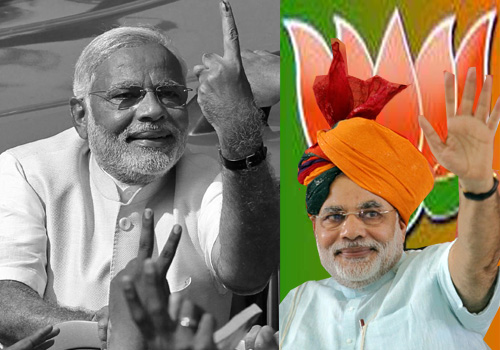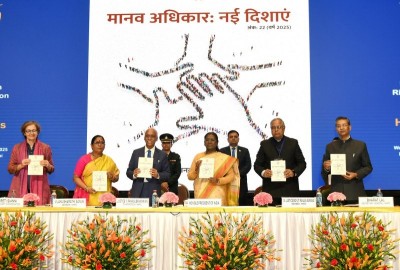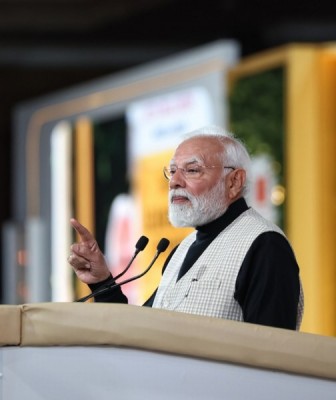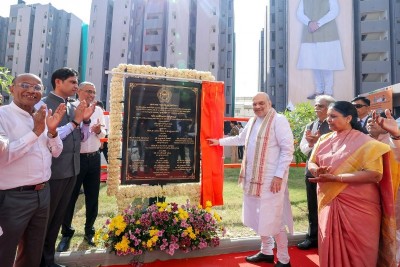
Narendra Modi: The Tea-seller Who Earned It
A landslide victory for 64-year-old Narendra Damodardas Modi's Bharatiya Janata Party (BJP) is not just about saffron rhetoric and rabble-rousing speeches and sneaking admiration for majority Hindus for those who talk of temples and a Hindu state. If we go back to the past few years of BJP timeline, we know Modi, a politician so aggressive that was never seen in India before, actually earned it. For a man who would boast his humble tea seller background and play it to often gallery and to the hilt, actually earned his due decimating political rival even within the party.
Modi is often slammed for distorting history, lowering the political discourse and held responsible for the 2002 Gujarat riots. But all that is now history. Narendra Modi, a four time Gujarat Chief Minister, is now the man of the moment. When he takes over as the Prime Minister of India, he would actually earn his place under the sun.
His political campaigns, which are often back to back and went on kind of endlessly, were electrifying and the man never was wanting in energy. From targetting the "Mother-son duo of Sonia Gandhi and Rahul Gandhi" to attack the Congress, to tearing apart West Bengal Chief Minister Mamata Banerjee for rejecting the overtures of BJP, Modi has been an aggressive campaigner all along.
According to his own website profile, Narendra Modi’s journey began in the by-lanes of Vadnagar, a small and nondescript town in North Gujarat’s Mehsana district.
Born on 17th Sept 1950, Modi was the third of the sixth children of Damodardas Modi and Hiraba Modi.Vadnagar is a town that is steeped in history.
Vadnagar station, where Narendra Modi’s father owned a tea stall, was where Narendra Modi also sold tea.
According to his biography, his early years were not very easy. It says: "The family belonged to the marginalized sections of society and had to struggle to make ends meet. The entire family lived in a small single storey house (approximately 40 feet by 12 feet). His father sold tea at the tea stall he set up in the local railway station. In his early years, Narendra Modi too lent a hand to his father at the tea stall."
It was his tea seller background that in this election Modi managed to hard-sell projecting himself as a man who rose from the grassroots.
Modi, it is said, used to spend more time in school library and was fond of swimming. He was also inspired by Swami Vivekananda's ideals.
A man who is held responsible for the 2002 post-Godhra anti-Muslim riots, Modi, according to his website biography, had many Muslim friends in his neighbourhood.
Modi also wanted to be in the Army. But perhaps destiny had other plans for Modi, who is also a Rashtriya Swayamsevak Sangh (RSS) member.
His personal life (he and his wife never almost lived together after initial few months) became a subject of poll debate since he would for the first time during filing his nomination for the Lok Sabha polls mention that he is a married man. Earlier he would leave the box for spouse blank. His wife Jasodaben Modi is a retired school teacher and they hardly lived together.
His wife would, however, remember him as a man who used to take interest even in kitchen matters initially.
Modi formally joined the RSS in early 1970s and was underground during the Emergency in India declared by Indira Gandhi in 1975.
It was in 1987 that Modi had first joined BJP. When in 1995 the BJP won a majority in Gujarat, began a new journey for Modi. Modi was the key strategist for the BJP in the 1995 and 1998 campaigns in the state.
He shot into limelight in 2001 when Keshubhai Patel exited as Gujarat chief minister after a devastating earthquake. As Modi stepped into the shoes of Keshubhai, there was no looking back.
But then came the 2002 riots after the burning down of Hindu kar sevaks (religious volunteers) in a train in Godhra in Gujarat. What followed was unprecedented rioting in Gujarat in which Muslims were killed. It is said about 1000 people and mostly from the minority community lost their lives in the riots when Modi had allegedly not acted enough to save them. Then BJP prime minister at the centre, Atal Bihari Vajpayee, had reminded Modi that he should do his "Rajdharma".
While Modi since then has been hounded by rights activists, political rivals and even foreign governments, he got clean chits from the courts, including the highest court (Supreme Court) in India.
He was even denied a US visa since 2005 for the riots and has been seen since then as an untouchable politically and internationally. But the rapid economic development of Gujarat and his meteoric rise in BJP, overtaking party patriarchs like LK Advani, forced everyone to take note. Also Modi used an aggressive marketing machinery and team and among all the political leaders in India, he is perhaps the first to tweet on every issue. Modi used social media and Internet to the hilt in furthering his political image.
Modi became such a brand that even T-shirts in his name flooded the market though his own fashion statement has been well ironed wrinkle-free kurtas procured from a store called Jade Blue in Ahmedabad.
His poll campaigns were almost telecast live on his websites, something that Congress or any other party failed to do so far. His website is perhaps a journalist's favourite tool since nothing is left out there and in real time.
Modi also became a darling of the industrialists in India cutting across their political connections and sectors. So even a Ratan Tata would take his Nano plant to Gujarat after the Singur land movement in West Bengal. It is said the industrialists were more keen to see him in New Delhi and had backed him all along.
With the landslide election victory, the unputdownable Modi will begin a new journey as the Prime Minister of India. Whether he lives up to the expectations of people time will tell, but for now, here is a politician who truly earned his position overcoming all the odds in a nation where dynastic politics and aristocracy ruled the roost for a very long time.
Support Our Journalism
We cannot do without you.. your contribution supports unbiased journalism
IBNS is not driven by any ism- not wokeism, not racism, not skewed secularism, not hyper right-wing or left liberal ideals, nor by any hardline religious beliefs or hyper nationalism. We want to serve you good old objective news, as they are. We do not judge or preach. We let people decide for themselves. We only try to present factual and well-sourced news.







